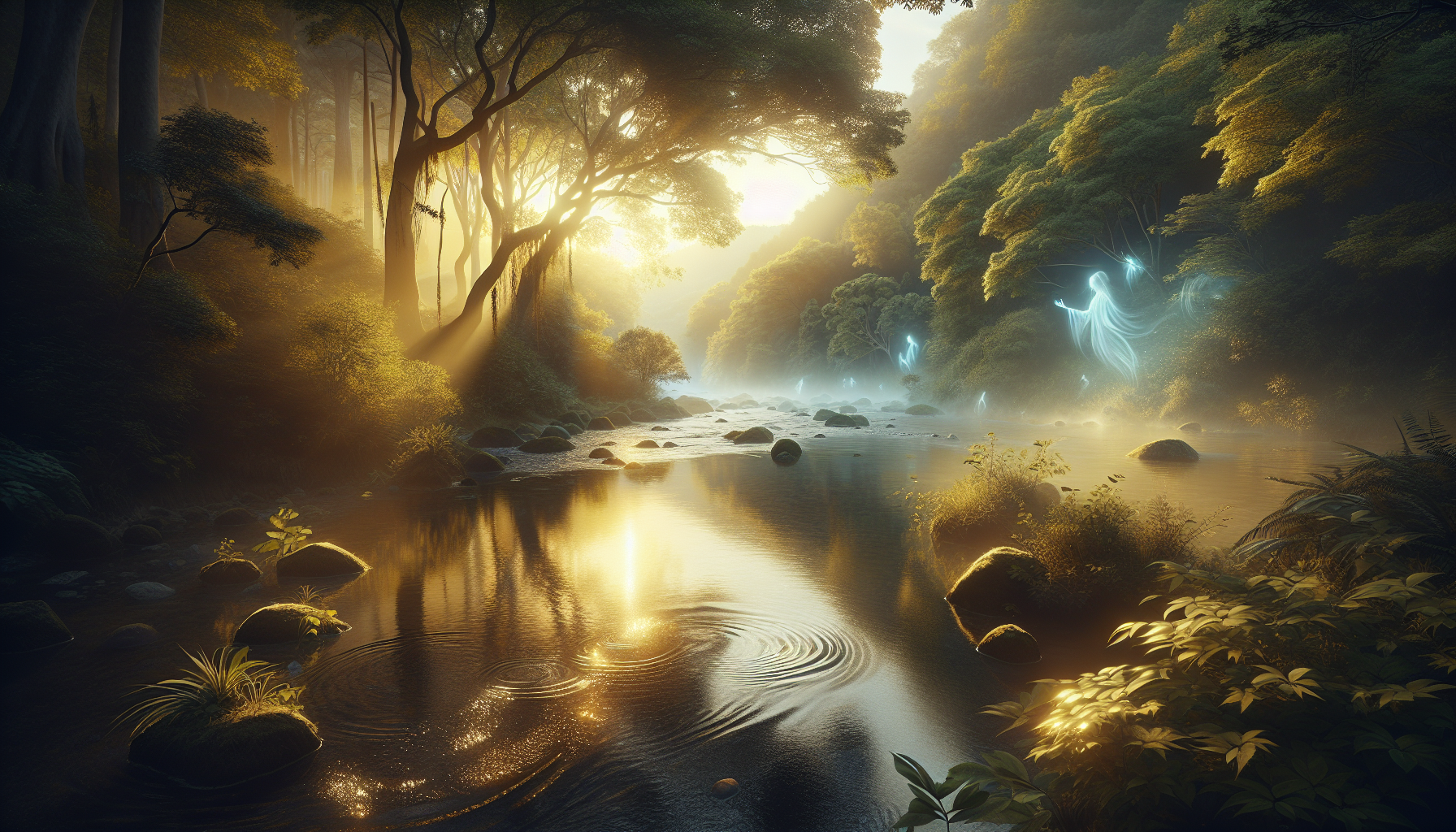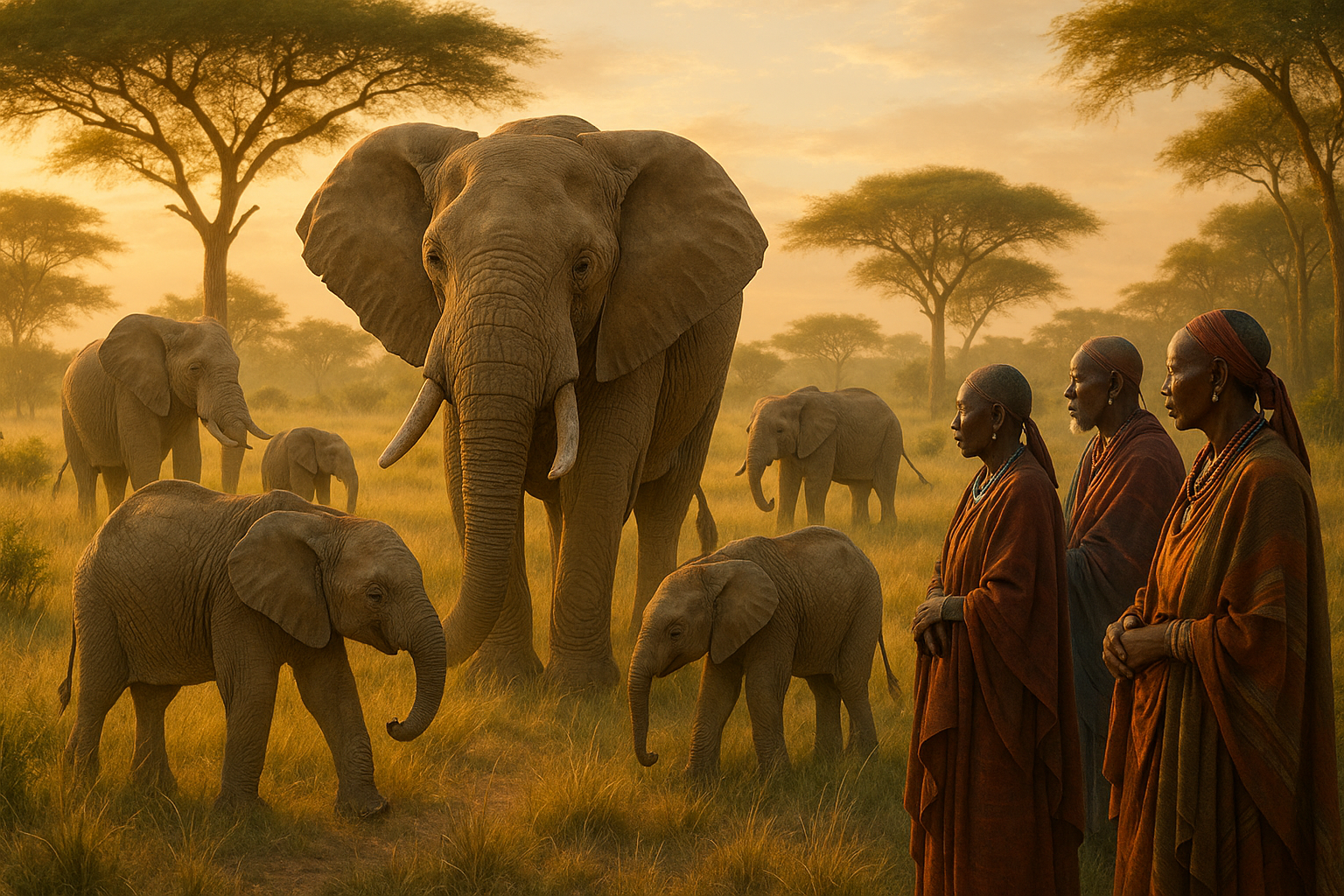In the heart of untouched wilderness, where the verdant canopy overhead filters the golden sunlight into a mosaic of dancing shadows, there exists a realm where the boundary between the physical and the spiritual world seems to blur. It is here, amidst the gentle rustling of leaves and the soft footfalls on moss-covered paths, that one encounters the whispers of nature—an enigmatic dialogue between murmuring rivers and the spirits said to dwell within. This ethereal connection has intrigued and inspired countless generations, inviting us to listen closely to the stories carried by the water as it weaves its way through the landscape. 🌿
The allure of rivers has captivated human imagination for millennia. These flowing bodies of water have been revered not just as vital sources of life, but as sacred entities imbued with spirit and memory. Many ancient cultures believed that rivers were living beings, guardians of the earth’s secrets, and gateways to other realms. From the mighty Ganges in India, regarded as a goddess herself, to the Nile, whose floods were once seen as the tears of the goddess Isis, rivers have been at the center of spiritual and cultural life. In modern times, this fascination endures, beckoning us to explore how the rhythmic cadence of flowing water continues to inspire awe and introspection, and to consider what whispers we might hear if only we paused to listen.
As we delve into this mystical relationship, we will explore several key themes that illuminate the connection between rivers and spirits. First, we will examine the cultural and historical significance of rivers in different spiritual traditions, uncovering the beliefs and rituals that have shaped human interaction with these natural wonders. Next, we will consider the scientific and psychological perspectives that attempt to explain why humans are so deeply moved by the presence of water, and how these insights can deepen our understanding of the spiritual connection. Finally, we will journey into the realm of personal experience and storytelling, sharing tales from those who have felt the presence of spirits in the murmurs of rivers, and offering guidance on how to cultivate a deeper, more mindful connection with the natural world.
This exploration is not just an academic inquiry, but an invitation to engage with nature in a profound and transformative way. Whether you are a seasoned spiritual seeker or a curious traveler drawn to the serenity of a riverside retreat, there is something universal in the call of the water that speaks to the soul. By the end of our journey together, you will have not only a greater appreciation for the cultural and spiritual dimensions of rivers but also a renewed sense of wonder for the world around you. So take a deep breath, open your heart to the whispers of nature, and let us embark on this mystical exploration of the unseen, where every ripple and eddy holds a story waiting to be told. 🌊
The Ancient Lore of Murmuring Rivers
Murmuring rivers have long captivated human imagination, embodying both beauty and mystery. These waterways, with their gentle sounds and fluid movements, have inspired countless stories and legends across cultures. In ancient times, people believed that spirits inhabited these rivers, granting them a mystical quality that was both revered and feared. These tales often spoke of river spirits as protectors of nature, ensuring that the balance of ecosystems was maintained. They were seen as benevolent entities that guided travelers, provided water for crops, and offered solace to those who sought peace. The idea of whispering rivers being alive with spirits added a layer of enchantment to these natural wonders, making them central to many cultural narratives.
Many indigenous cultures hold the belief that rivers are sacred. They view these water bodies as living entities that possess a spirit of their own. This perspective is not just a myth but a way of life, influencing how they interact with the environment. The spiritual significance attributed to rivers often dictates the practices and rituals performed by these communities. For example, offerings might be made to appease the river spirits, ensuring plentiful rains and bountiful harvests. These traditions highlight the deep connection between nature and spirituality, emphasizing the importance of respecting and preserving the natural world.
Modern science has begun to explore the connections between natural environments and mental well-being, supporting what ancient cultures have long understood: that nature, with its calming sounds and sights, can have a profound impact on human health. The gentle murmur of a river can reduce stress, lower blood pressure, and enhance feelings of peace and tranquility. These benefits are being recognized more widely, leading to a growing interest in preserving natural landscapes and integrating them into urban planning. As we continue to explore these connections, we gain a deeper appreciation for the wisdom of ancient cultures and the role of nature in our lives.
The Science Behind River Murmurs
The soothing sound of a murmuring river is not just a result of water flowing over rocks; it is a complex interplay of acoustics and physics. Scientists have studied how the shape of a riverbed, the speed of the water, and the presence of various obstacles such as stones and logs contribute to the unique sound profile of each river. These elements create a symphony of natural sounds that can be both calming and invigorating. The frequency and amplitude of these sounds vary depending on the physical characteristics of the river, making each one distinct.
Research has shown that the sound of water can have a significant impact on our brain activity. Listening to natural sounds like those of a murmuring river can enhance our focus, reduce stress, and even improve our mood. This is due to the way our brains process these sounds, which are often associated with relaxation and tranquility. Unlike the jarring noises of urban environments, the sound of water promotes a state of calm and mindfulness. This discovery has implications for mental health therapy, where natural sounds are being used to treat anxiety and depression.
| Element | Influence on Sound |
|---|---|
| Riverbed Shape | Alters sound frequency and amplitude |
| Water Speed | Increases or decreases sound intensity |
| Obstacles (rocks, logs) | Create variations in sound |
Cultural Connections to River Spirits
Throughout history, rivers have held a central place in the myths and legends of many cultures. In Greek mythology, rivers were personified as gods, each with distinct personalities and powers. The River Styx, for example, was believed to be a boundary between the world of the living and the dead, while the river god Alpheus was known for his love story with the nymph Arethusa. These stories highlight the reverence with which ancient Greeks viewed their rivers, attributing them with divine qualities.
In other parts of the world, rivers are seen as dwelling places for spirits that influence the lives of those who live near them. In Japanese culture, the concept of ‘kawa no kami’ refers to river deities that oversee the well-being of local communities. Offerings and rituals are often performed to honor these spirits, ensuring harmony and prosperity. Similarly, in the Amazon, indigenous tribes believe in water spirits that protect the natural resources of the rainforest, guiding their practices and beliefs.
Preserving the Mystical Essence of Rivers
In the modern world, the mystical essence of rivers is at risk due to environmental degradation and urban development. Pollution, deforestation, and climate change threaten the delicate ecosystems that rivers support, endangering the species that rely on them. This has prompted a growing movement to protect and preserve these vital waterways, recognizing their importance not only for the environment but also for human well-being.
Efforts to preserve rivers often involve a combination of conservation practices and community engagement. By raising awareness of the cultural and ecological significance of rivers, conservationists hope to inspire action and change. This includes promoting sustainable practices, such as reducing pollution and implementing water management strategies that ensure the health of river ecosystems. Additionally, engaging local communities in conservation efforts is crucial, as they are often the most directly impacted by changes to their environment.
The preservation of rivers is not just about protecting the physical landscape; it is also about maintaining the spiritual and cultural connections that people have with these natural wonders. By safeguarding rivers, we preserve the stories, traditions, and beliefs that have been passed down through generations. This holistic approach to conservation ensures that the mystical essence of rivers continues to inspire and sustain us for years to come.
- Understand the cultural significance of rivers and their role in mythology.
- Learn about the scientific benefits of river sounds on mental health.
- Explore conservation efforts to protect and preserve river ecosystems.
For a deeper understanding of how rivers connect with both nature and spirituality, watch the video above and immerse yourself in the tranquil world of whispering rivers.

Conclusion
Conclusion: Whispers of Nature: Exploring the Mystical Connection Between Murmuring Rivers and Spirits
Throughout our exploration of the mystical ties between murmuring rivers and the spirits that are believed to inhabit them, we’ve traversed a rich tapestry of cultural beliefs, scientific theories, and personal anecdotes. The journey has not only highlighted the profound respect many cultures hold for these natural bodies of water but has also showcased the broader human fascination with the unseen and the spiritual.
At the heart of our exploration lies the understanding that rivers are more than just physical entities; they are vital symbols in many societies, representing life, renewal, and the cyclical nature of existence. From the ancient myths that speak of river deities to contemporary spiritual practices that view rivers as conduits of energy, it’s evident that water holds a sacred place in the human psyche.
We delved into various cultural narratives, from the Greek mythology of the River Styx, a boundary between Earth and the Underworld, to the reverence of the Ganges River in Hinduism, considered a living goddess and a purifying force. These stories underscore the common theme of rivers as transitional spaces, where the physical and spiritual worlds meet.
On a more scientific note, we explored how the natural sounds of rivers—gentle murmurs and powerful roars—can evoke a sense of calm and well-being. Studies in psychoacoustics suggest that these sounds can alter brainwave patterns, promoting relaxation and even healing. This intersection of science and spirituality opens a fascinating dialogue on how nature’s rhythms resonate with our own inner states.
The importance of preserving these natural wonders cannot be overstated. As modernity and industrialization encroach upon the natural world, the mystical and restorative qualities of rivers are at risk. It’s crucial that we recognize their ecological significance alongside their spiritual and cultural values. Conservation efforts are paramount to ensure that future generations can continue to find solace and inspiration in these waterways.
This journey has also prompted a reflection on our personal connections with nature. In a world that is increasingly digital and disconnected, tuning into the whispers of rivers can be a grounding practice, reminding us of our place in the larger tapestry of life. Whether through meditation by a riverbank, participating in rituals, or simply taking a mindful walk along a waterway, engaging with these natural spaces can foster a deeper sense of belonging and peace.
As we conclude, it’s important to consider how we can incorporate the lessons learned from rivers into our daily lives. Can we embrace their flow and adaptability in times of change? Can we find strength in their persistence and resilience? The whispers of nature invite us to listen, reflect, and grow.
We encourage you, dear reader, to carry forward this exploration. Share your own experiences and stories of rivers that have touched your life. Engage with communities that honor these traditions and consider the role you can play in preserving these sacred sites. 🌊
Please feel free to comment below with your thoughts or share this article with others who might be inspired by the mystical connection between rivers and spirits. Together, we can cultivate a deeper appreciation for the natural world and its myriad wonders.
For further reading on the topics discussed, consider exploring these resources:
– National Geographic on River Ecosystems
– The Role of Rivers in Mythology and Religion by Sacred Texts
– Psychoacoustic Effects of Natural Sounds
May the whispers of the rivers guide you on your own spiritual and ecological journey, inspiring you to listen more deeply and act more consciously. 🌿
Toni Santos is a sound storyteller and folklore researcher whose creative path bridges the mystical and the biological through the lens of bioacoustic folklore. With an ear attuned to the voices of nature, Toni explores how ancient cultures interpreted birdsong, forest echoes, and animal calls—not as noise, but as messages, omens, and myths encoded in sound.
Rooted in a passion for both natural science and ancestral lore, his work uncovers the forgotten connections between ecosystems and oral traditions. From the whispered warnings in owl cries to the songs of frogs heralding rain, Toni’s narratives evoke a time when humans listened to nature with reverence and meaning.
Drawing on a background in ecological arts and auditory storytelling, Toni merges field recordings with mythic imagery, turning natural sounds into cultural artifacts of wonder. His stories do more than entertain—they restore a way of hearing the world that blends intuition, memory, and deep listening.
As the creative force behind Vizovex, Toni offers sonic tales, symbolic soundscapes, and research-based reflections that help others rediscover the sacred language of the wild.
His work is a tribute to:
The mythological significance of animal and elemental sounds
Ancient practices of listening for meaning in nature
The spiritual dialogue between humans and soundscapes
Whether you’re a folklorist, an acoustic ecologist, or a curious listener, Toni invites you into a world where the forest speaks, and every chirp, croak, and howl carries a story—one echo, one legend, one call at a time.



